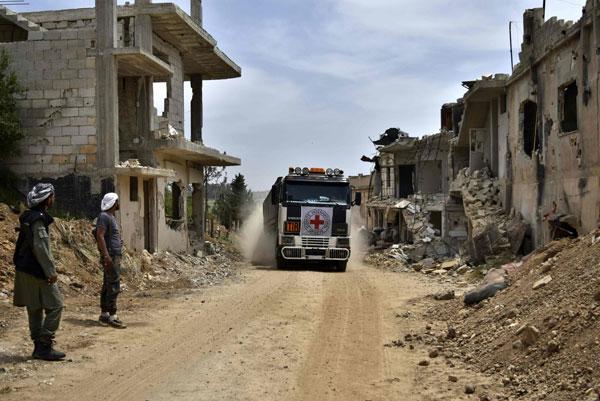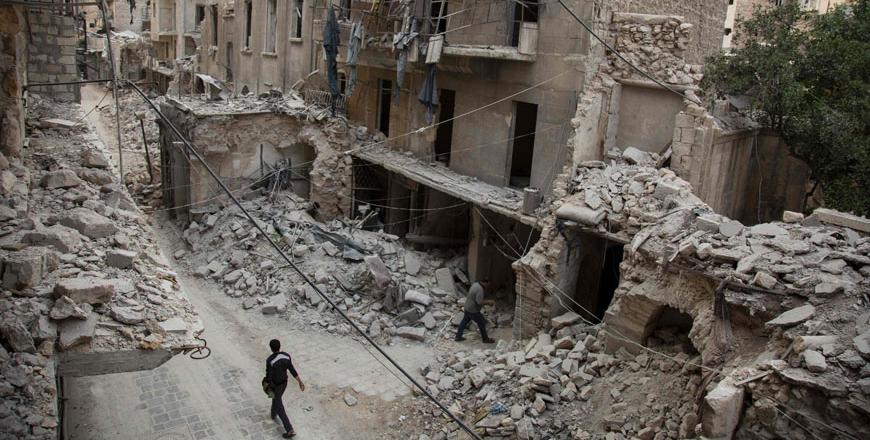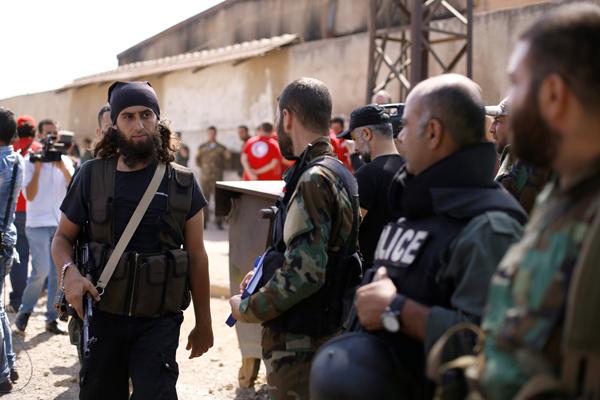You are here
Kerry aims to extend truce to Syria’s Aleppo as ceasefire unravels
By Reuters - May 02,2016 - Last updated at May 02,2016

An aid truck of the International Committee of the Red Cross drives past destroyed buildings in the rebel-held village of Teir Maalah, on its way to Talbisseh, on the northern outskirts of Homs in central Syria, on Monday (AFP photo)
AMMAN/GENEVA — Washington and Moscow said on Monday they were working hard to extend a truce in Syria to Aleppo, the divided northern city where a sharp escalation of violence in recent weeks has left a ceasefire in tatters and torpedoed peace talks.
US Secretary of State Joahn Kerry was in Geneva for meetings with other dignitaries to try to revive the two-month-old US and Russia-sponsored cessation of hostilities, which quieted guns for the first time during the five-year Syrian war but which has unravelled in recent days.
Syria announced temporary local truces in two areas last week. But those agreements have not been extended to Aleppo, where government air strikes and rebel shelling have killed hundreds of civilians in the past week, including more than 50 people in a hospital rebels say was deliberately targeted by the army.
The Aleppo fighting threatens to wreck the first peace talks involving the warring parties, which are due to resume at an unspecified date after breaking up in April when the opposition delegation walked out citing government ceasefire violations.
"We're getting closer to a place of understanding, but we have some work to do, and that's why we're here," Kerry said at the start of a meeting with Saudi Foreign Minister Adel Al Jubeir.
Kerry said he hoped for more clarity in the next day or so on restoring the nationwide ceasefire. The United States and Russia had agreed to keep extra staff in Geneva to work on it.
"Both sides, the opposition and the regime, have contributed to this chaos, and we are working over the next hours intensely in order to try to restore the cessation of hostilities," Kerry said.
He later spoke by telephone to Russia's Foreign Minister Sergei Lavrov. The Russian foreign ministry said they both called on all sides to observe the ceasefire. A Russian military official, General Sergei Kuralenko, said talks were under way on extending the local truces to Aleppo.
Aleppo key to peace
The United States and Russia have taken the leading roles in diplomacy since Moscow joined the war last year with an air campaign that tipped the balance of power in favour of President Bashar Assad, its ally.
Washington is among Western and regional powers that say Assad must leave office. The White House said on Monday Assad’s government needed to live up to its ceasefire commitments.
The civil war in Syria has killed hundred of thousands of people, driven millions from their homes, created the world’s worst refugee crisis and provided a base for Daesh militants who have launched attacks elsewhere.
All diplomatic efforts to resolve it have foundered over the fate of Assad, who refuses to accept opposition demands that he leave power.
The local truces, known as a “regime of calm”, were launched in the Eastern Ghouta suburb of Damascus and the countryside of northern Latakia province from Saturday morning in a bid to revive the overall ceasefire. The Latakia truce was for three days and the Ghouta truce, initially for 24 hours, was also extended by another 48.
Both cover areas where there has been heavy fighting. But without a similar truce in Aleppo, divided for years between government and rebel zones, there appears to be little hope of restoring the overall ceasefire so talks can resume.
De Mistura, due to travel to Moscow for talks with Lavrov, said in a statement there could be no progress in political talks without the ceasefire and other steps to bring “tangible benefits on the ground for the Syrian people”.
Aleppo remains the biggest prize for Assad’s forces hoping to take full control of the city, Syria’s largest before the war. The nearby countryside includes the last strip of the Syria-Turkish border in the hands of Arab Sunni rebels.
Civilians killed
The opposition accuses the government of deliberately targeting civilians in rebel held parts of Aleppo to drive them out. For its part, the government says rebels have been heavily shelling government-held areas, proving they are receiving sophisticated weapons from foreign sponsors.
A British-based monitoring group, the Syrian Observatory for Human Rights, has reported scores of civilians killed on both sides in recent days, although more in rebel-held territory.
Syrian state television said on Monday that a missile had hit the surroundings of Aleppo University Medical Hospital, and several civilians were injured by rebel mortar attacks on the residential area of Jamiyat Hay Al Zahra in western Aleppo.
The rebel-held local council of Aleppo city announced a state of emergency in areas it runs due to the intense bombardment. About 350,000-400,000 people are believed to remain in rebel-held parts of what was once a city of 2 million.
Mohammad Muaz Abu Saleh, a senior councillor in the rebel Aleppo governate council, said residents were nonetheless not abandoning opposition-held areas.
“Those who wanted to leave Aleppo have fled,” he said. Those who have stayed behind “have decided to stay under all circumstances of shelling and siege. Aleppo will remain populated with its people not leaving”.
Amar Al Absi, a resident of a rebel-held area, said: “There was heavy shelling throughout the night. In my neighbourhood, Salah Al Deen, a missile hit a building that was empty and it was levelled but there were no casualties.”
In Hama, a western city, government troops surrounded a prison and fired teargas to put down a revolt by inmates, who seized several guards in protest against their planned transfer to a military prison, the observatory reported.
In countryside north of Aleppo, other rebel groups have battled Daesh militants who are not party to any ceasefire. Amaq, a news agency affiliated to Daesh, said the militants had gained control of three villages near the border with Turkey, cutting supply routes of other rebels, despite Turkish shelling.
The observatory said the militants had staged a counterattack to regain ground lost from other rebels in to-and-fro fighting that has seen no major gains for any side.
Two rockets hit the Turkish town of Kilis near Daesh positions in Syria on Monday, killing one person and wounding others, a security source told Reuters. The source said the Turkish military returned fire hitting Daesh targets. Ankara said it had killed 34 militants on Sunday.
Turkey, a NATO ally and backer of anti-Assad rebels, is part of a US-led coalition launching air strikes against Daesh but is also strongly opposed to the main Kurdish militia in Syria, Washington’s closest ally on the ground.
Another major supporter of the rebels is Saudi Arabia, whose Foreign Minister Jubeir blamed the latest escalation on the government and called for Assad to step down.
“He can leave through a political process, which we hope he will do, or he will be removed by force,” Jubeir said alongside Kerry.
Related Articles
BEIRUT/MOSCOW — Rebel fighters launched an assault in Syria's divided northern city of Aleppo on Tuesday and fired rockets on a hospital, in
BEIRUT — The Syrian Observatory for Human Rights said air strikes hit rebel-held parts of Aleppo just hours into an announced 48-hour ceasef
BEIRUT —Warplanes mounted the heaviest air strikes in months against rebel-held districts of the city of Aleppo overnight, as Russia and the


















